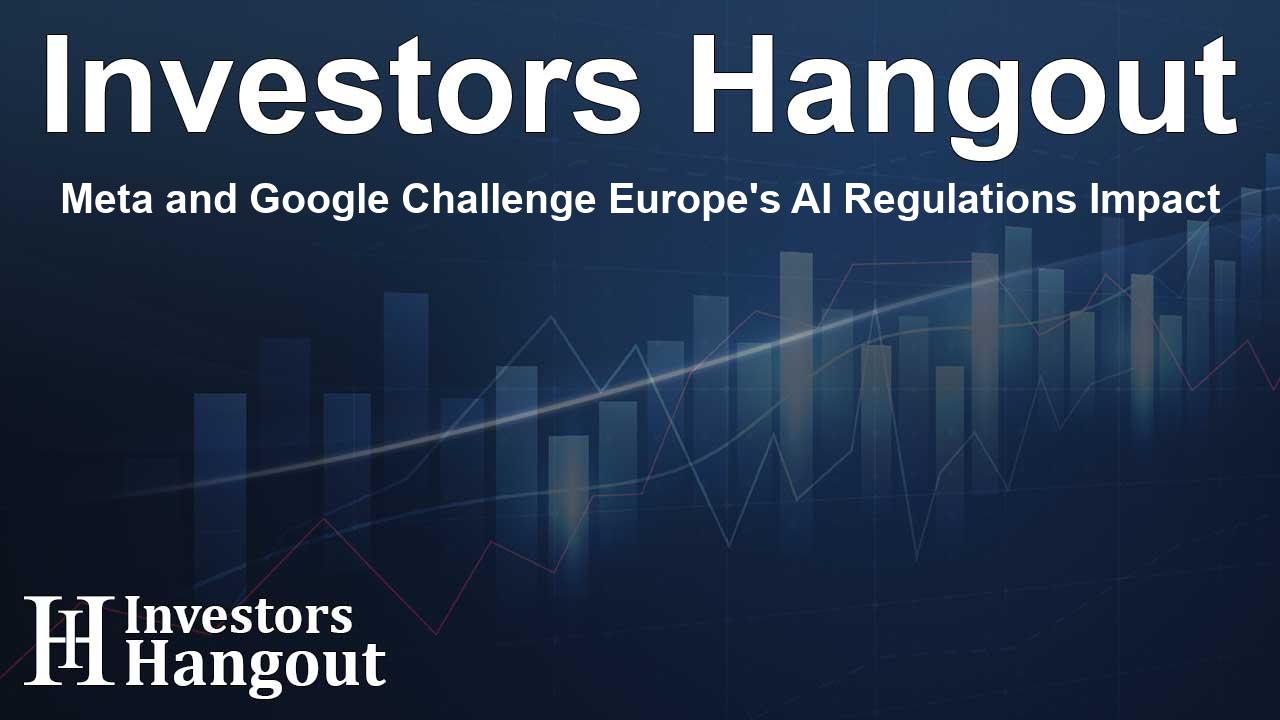Meta and Google Challenge Europe's AI Regulations Impact

Meta and Google's Take on Europe's AI Regulations
Meta Platforms Inc (NASDAQ: META) and Google (NASDAQ: GOOGL, NASDAQ: GOOG) recently raised important issues regarding Europe’s increasing regulations surrounding artificial intelligence (AI). Leaders from both companies express that such stringent regulations may inadvertently hinder the technological growth within Europe.
Concerns at the Techarena Conference
During a recent gathering at the Techarena tech conference, public policy executives from these tech titans discussed the challenges posed by stringent AI regulations. They echoed the sentiment that Europe’s current framework for regulating AI and machine learning technologies seems overly prohibitive and may stifle innovation.
Fragmentation of Regulations
Chris Yiu, Meta’s director of public policy, articulated that European tech regulations often feel chaotic and sometimes overreaching. He suggested that there is a growing acknowledgment that such regulations, reminiscent of the General Data Protection Regulation (GDPR), can lead to product delays and the creation of less effective technology versions. He noted, "The European regulation is sometimes so fragmented that it creates hurdles, sometimes it goes too far, like with the AI Act."
Regulatory Hurdles Impacting Innovation
As a notable example, Yiu pointed to the launch of Meta’s Ray-Ban smart glasses, equipped with AI functions to assist individuals with visual impairments. Regulatory challenges caused delays, preventing timely introduction to the market, thus showcasing how regulations can affect the availability of innovative products in Europe.
Google’s Perspective on AI Policies
Similarly, Dorothy Chou, the head of public policy at Google DeepMind, reflected Yiu’s views. She stated that the AI Act was drafted prior to the emergence of several new technologies, making its effectiveness questionable. She further added that policies ought to promote an improving investment climate rather than serve as obstacles to advancement in technology.
Lobbying Efforts for Change
Amidst these challenges, both Meta and Google have ramped up their lobbying initiatives to reshape aspects of the AI Act in Europe. They are particularly focused on addressing concerns that could result in unfavorable regulations, which might curb their operational capabilities within the region.
Legal Battles Over Regulations
In early developments, Google contested a significant EU antitrust fine, arguing that user preference for its services justifies its operational model. Meanwhile, Meta announced its intention not to adhere to the EU AI Code of Practice, hinting at a larger strategy to push back against what they perceive as overreaching regulations.
Future Relations with Regulatory Bodies
Meta also implied a potential shift in their strategy should negotiations falter, suggesting they might leverage political relationships to advocate for less rigid regulations. The EU's antitrust chief, Teresa Ribera, has made it clear that regulatory decisions will still strictly adhere to their evidence-based principles.
Consequences of Non-Compliance
Both companies face significant scrutiny under the EU’s Digital Markets Act, with the risk of incurring fines that can reach up to 10% of their global annual revenue if they fail to comply with regulations. Ribera has reinforced the necessity of maintaining a balanced approach to regulation in alignment with upholding human rights and democratic values.
Conclusion
As discussions about technology regulation continue, both Meta and Google represent a growing concern among tech giants about Europe's regulatory landscape. Their stance is clear: they advocate for regulations that foster innovation rather than serve as roadblocks. The ongoing push for a balanced regulatory framework reflects their commitment to ensuring that technological advancements can thrive in Europe’s marketplace.
Frequently Asked Questions
What are the main concerns Meta and Google have regarding AI regulations in Europe?
Both companies believe that overly stringent regulations hinder innovation and growth within the tech sector in Europe.
How do regulations impact Meta's products, such as the Ray-Ban smart glasses?
Regulatory challenges delayed the launch of the Ray-Ban smart glasses, showcasing how regulation can affect product availability.
What is the AI Act mentioned by Meta and Google?
The AI Act is a legislative framework in Europe that aims to regulate artificial intelligence technologies, which some argue is too rigid for emerging technologies.
What are the potential fines for non-compliance with EU regulations?
Companies can face up to 10% of their global annual revenue in fines for not adhering to the Digital Markets Act and other regulatory requirements.
Will Meta and Google take further actions if regulations do not change?
Meta has indicated possible political advocacy if discussions regarding regulations do not yield favorable outcomes for tech companies.
About The Author
Contact Olivia Taylor privately here. Or send an email with ATTN: Olivia Taylor as the subject to contact@investorshangout.com.
About Investors Hangout
Investors Hangout is a leading online stock forum for financial discussion and learning, offering a wide range of free tools and resources. It draws in traders of all levels, who exchange market knowledge, investigate trading tactics, and keep an eye on industry developments in real time. Featuring financial articles, stock message boards, quotes, charts, company profiles, and live news updates. Through cooperative learning and a wealth of informational resources, it helps users from novices creating their first portfolios to experts honing their techniques. Join Investors Hangout today: https://investorshangout.com/
The content of this article is based on factual, publicly available information and does not represent legal, financial, or investment advice. Investors Hangout does not offer financial advice, and the author is not a licensed financial advisor. Consult a qualified advisor before making any financial or investment decisions based on this article. This article should not be considered advice to purchase, sell, or hold any securities or other investments. If any of the material provided here is inaccurate, please contact us for corrections.
